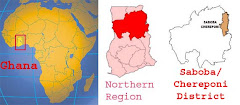To my saving grace, the rains have come. At least three times a week Saboba has a thunder and lightning storm with high winds and heavy rains. Though these random showers almost always seem to coincidentally occur just hours after I have done laundry and left my clothes out to dry, it is a blessing none the less.
Living in my host community has really allowed me to observe, and participate, in farmer’s livelihoods. Now that the rains have come a lot is changing in Saboba and my village. In Saboba the tractor traffic has increased five fold, and diesel sales have soared. As for my village, men have sprung into action. Every morning at 6am, men and boys leave for the fields to farm yams, maize, and many other crops I can’t remember. The days of sitting in the shade weaving grass or playing Oware are finished for men. Now backbreaking labour has become the focus of everyday.
But to the men of this community, they’re happy to be at work. The longer the rains delay, the higher the likelihood the lean season will extend. The rainy season is sometimes called the lean season because it is this season that is furthest away from their last harvest. It’s around this time that food stocks start to deplete and rations decrease in size. So the faster farmers can get the crops in the ground the better, because it means an earlier harvest.
The reason why I call it backbreaking labour is because that is exactly what it is. For those that can afford it, tractors are used plough fields. Sitting in my room at night I can hear the roar of the tractors as they pass right by my compound to return to town after a day in the field.
But for the majority of farmers, hand tilling is still the way to prepare the field. What a tractor does in 10seconds would take an individual farmer 1 hour. Some of you may have wondered why farmers would delay in preparing their fields if the rains didn’t come. The reason why is because after the long dry season, the earth becomes similar to concrete and hand tilling is extremely difficult. Thus farmers wait until the first rains have come and soften the ground, to till. Also, I’m not sure why, but you only sow seeds after the first rains. Anyone who has that answer, please help out.
The only thing we now have to watch out for, is that the rains don’t continue too long. For the mean time the rains are a great blessing, but too much rain means huge consequences for farmers. Seeing as



1 comment:
hey nick!
from my limited gardening experience, I think you wait until the first rains because seeds some water to start germinating. And also you'd want to till the soil first - aerate it and loosen it up so the little seed roots can get started and will be able to make it through the dirt. and i guess (or at least i've been lead to believe that once the rains start they keep coming -thats the idea right
i'm growing tomatoes, lettuce, beets, onions, squash spinach and herbs this summer - and well - we have had quite a bit of rain here as you can imagine. my mom always told me that when you first plant something you should give it a lot of water right away to get it started.
I'm currently at home - our new place now has furniture which is pretty exciting - it looks pretty cool - you'd be super impressed by the couch - steve can even sleep on it! :) and I'm listening to GUN, which apparently is 'sick', not sure if thats the way i feel about it though :)
otherwise, things are going well here. kayaking and office work as taking up an awful lot of my time. kris just got a job at a micro hydro firm and he's so excited. been biking around the city a lot - i have a pretty purple road bike now, which works most of time.
anyways - got completely off track - hope things are going really well - you are doing an amazing job keeping up with your blog! are you picking up the language well? whats your family like? how does ghana compare to zambia?
hugs
anna - kris says hi and sends hugs as well
Post a Comment